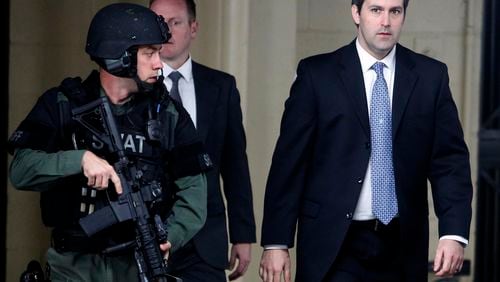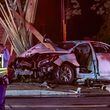A mistrial Monday in the murder case involving a South Carolina police officer provides a powerful example of the difficulty in convicting an officer even in questionable police shooting cases where video evidence exists.
The video of North Charleston officer Michael T. Slager shooting Walter Scott in the back as he fled on foot after a traffic stop caused outrage across the nation following the April 2015 incident.
"It is troubling," said Phil Stinson, a nationally recognized expert on police misconduct who is a professor at Bowling Green State University in Ohio. "This case of all the cases to me was the one when I looked at a video and my immediate thought was 'Wow. He just executed a man.'"
Still, officers almost never face charges in the more than 900 fatal police shootings each year and those that do are rarely convicted, according to Stinson's data. Only six officers have been criminally convicted in fatal shootings since the 2014 case in Ferguson focused attention of police violence
Of those cases, five involved officers convicted of manslaughter and one involved a murder conviction, Stinson said. He said grand juries and trial juries often times will side with police, even in cases where the evidence suggests the shooting was bad.
Since Stinson started collecting data on police misconduct in 2005, he found 78 fatal shootings in which officers were charged.
Of those cases, 27 were convicted, including 14 by jury trial and 13 involving a guilty plea. Only one case involved a murder charge that stuck, he said.
Credit: Brad Schrade
Credit: Brad Schrade
In Slager’s case, jurors had both murder and manslaughter charges to consider. But after days of deliberation, the jury couldn’t reach a verdict and a judge declared a mistrial.
Caren Morrison, a Georgia State University law professor and former federal prosecutor, said in police shooting cases some jurors faced with the traditional spectrum of charges, particularly murder, seem unwilling to convict an officer for actions performed in the line of duty.
She said the outcome in South Carolina and other recent cases across the country doesn’t portend well for chances of getting a conviction in two fatal police shooting cases where officers were indicted for murder this year in Georgia.
“There’s a problem when you charge a police officer with murder in these types of cases,” she said. “The problem is there’s enough people who are on juries that feel these charges don’t fit the crime.”
Morrison wonders if prosecutors in police shooting cases would be wiser to pursue lesser charges on which a jury of 12 could agree.
"In the end, that might serve justice better," she said.
In Georgia, the two fatal shooting cases this year where officers were charged – former DeKalb County police officer Robert Olsen and former Atlanta police officer James Burns – are rare.
An AJC investigation last year revealed that no officer faced criminal prosecution in more than 170 fatal shooting cases in Georgia over a period of six years. Most are deemed justified and resolved without ever going to a grand jury. But in cases that went to a grand jury, prosecutors rarely presented an indictment for consideration.
And when an indictment was presented, special legal privileges Georgia afforded officers, including unchallenged testimony often swayed swayed grand jurors. Only one case from 2010 to 2015 resulted in an indictment in Georgia and that was thrown out by a judge the day after the grand jury met based on the prosecutor’s request.
About the Author





/cloudfront-us-east-1.images.arcpublishing.com/ajc/P7DYBH6TO7FEKG4SUXQQKADRXE.jpg)


